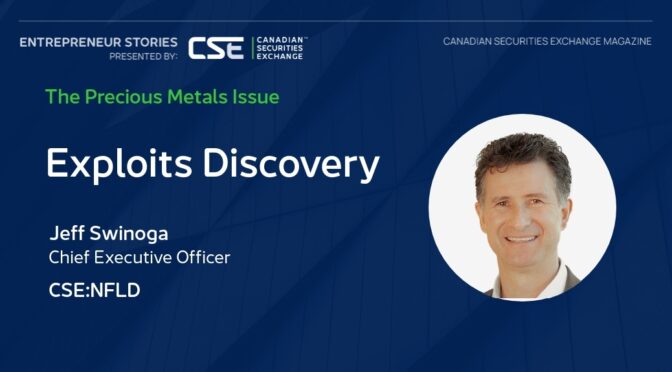Gold Hunter Resources (CSE:HUNT; OTCQB:HNTRF) is not just another junior explorer with a big land package. It is a team that delivered meaningful shareholder value in 2024 and is now returning to Newfoundland with a fully consolidated district, deep technical leadership, and a strategy rooted in data, geology, and discipline.
At the heart of the company’s plan is the Great Northern Project, a 26,000-hectare district-scale land package running along the Doucers Valley Fault. While nearly 500 historical drill holes exist, they are concentrated in just four small areas. In contrast, 18 gold-bearing trends remain virtually untested. The result is a rare mix of scale, infrastructure access, and near-term upside in one of North America’s most supportive mining jurisdictions.
In 2023, Gold Hunter sold its initial Newfoundland asset to FireFly Metals in a transaction valued at over $30 million. More than $25 million worth of FireFly shares were issued directly to Gold Hunter shareholders, creating immediate and tangible value during a quiet junior market.
But the exit was not the end of the story. Just 5 kilometres from the original ground, Gold Hunter began consolidating an even larger opportunity. Through more than 10 separate transactions with private holders and small operators, the company unified a 50-kilometre trend along the Doucers Valley Fault. This marked the first time this corridor has ever been controlled by a single entity.
The company’s success in quietly acquiring these projects ahead of better-capitalized competitors has set the foundation for something bigger.
The Great Northern Project follows a proven structural template: a major regional fault with multiple mineralized splays, hosted in rocks nearly identical to those at Equinox Gold’s Valentine Project.
“Although this is structurally complex like most mineralized gold systems, our approach is systematic,” says Chief Executive Officer Sean Kingsley. “Once you understand the controls, you can start stringing deposits together. It’s a classic string-of-pearls model.”
That model has worked well at Valentine. Starting with a small initial resource, it was built into a 5-million-ounce system with clear continuity and expanding scale. Gold Hunter sees Great Northern as following that same path, with a more advanced starting point thanks to nearly 500 legacy drill holes, robust geochemical coverage, and district-scale consolidation already complete.
Rather than rush into drilling, Gold Hunter spent three months in 2024 compiling the first full district-scale dataset ever assembled in this region. The team aggregated historic work from over a dozen sources, including past operators, government surveys, and private holders, into a single coherent exploration model.
The database includes more than 36,000 soil samples, 7,700 rock samples, 500 lake and stream sediment samples, 660 till samples, 5,700 mapped outcrops, multiple smaller geophysical surveys, and over 66,000 metres of historical drilling. That effort revealed high-priority trends that had previously fallen through the cracks due to fragmented ownership and limited budgets.
“Now that we’ve compiled the data, we’re layering in geophysics to take it further,” says Kingsley. “The VTEM survey we’re flying over the entire district will help us pinpoint new structural corridors, extensions of known zones, and areas that were never tested properly.”
Gold Hunter’s project is located in one of the most mining-friendly and accessible regions of Canada. Infrastructure is already in place, including hydroelectric power on site, highway access within walking distance, a mill located just over the ridge, and a deep-sea port facility just a few kilometres away.
“These are the things that matter when you’re looking to build value fast,” Kingsley says. “We don’t need to build roads, power lines, or ship ore across the country. We’re right where we need to be.”
In addition, Newfoundland and Labrador offers supportive permitting frameworks, experienced local workers, and a government eager to promote responsible resource development. These are factors that continue to attract serious exploration and development activity across the province.
Unlocking regional-scale gold systems takes more than ground. It takes people who understand how these systems behave.
Gold Hunter’s technical lead, Rory Kutluoglu, brings both geoscience and geophysics expertise and played a key role in Kaminak’s Coffee Gold deposit, which was acquired by Goldcorp for US$520 million. He sees Great Northern as another high-potential system, this time with infrastructure and historical drilling already in place.
On the ground, veteran Newfoundland geologists Tanya Tettelaar and David Copeland offer unmatched local knowledge. Tettelaar spent six years as exploration manager at Marathon Gold, helping advance Valentine through its critical growth phases. Copeland has worked directly on parts of the Great Northern land package for over a decade and was instrumental in building the Goldboro deposit, now part of NexGold.
“This is one of the strongest technical teams I’ve worked with,” says Kingsley. “We’ve got national-level discovery experience and local geological intuition coming together. That’s how you de-risk exploration.”
Kingsley himself has been active in Newfoundland and Labrador since the early 2010s and sees the province as one of the last places in North America where major new discoveries are still possible.
With a past win under its belt, a fully consolidated district, an expansive geological and geophysics dataset, and a proven technical team, Gold Hunter is positioned to help write the next chapter of Newfoundland’s gold story.
The company has completed its initial VTEM survey and is in the midst of ground truthing drill targets for 2025. Every metre will be guided by data. Every target will build on a district-wide vision.
“We’ve done the hard work. Acquisition, compilation, modelling, and survey execution,” says Kingsley. “Now it’s time to drill. And we know exactly where to start.”
This story was featured in Canadian Securities Exchange Magazine.
Learn more about Gold Hunter Resources https://goldhunterresources.com/.










